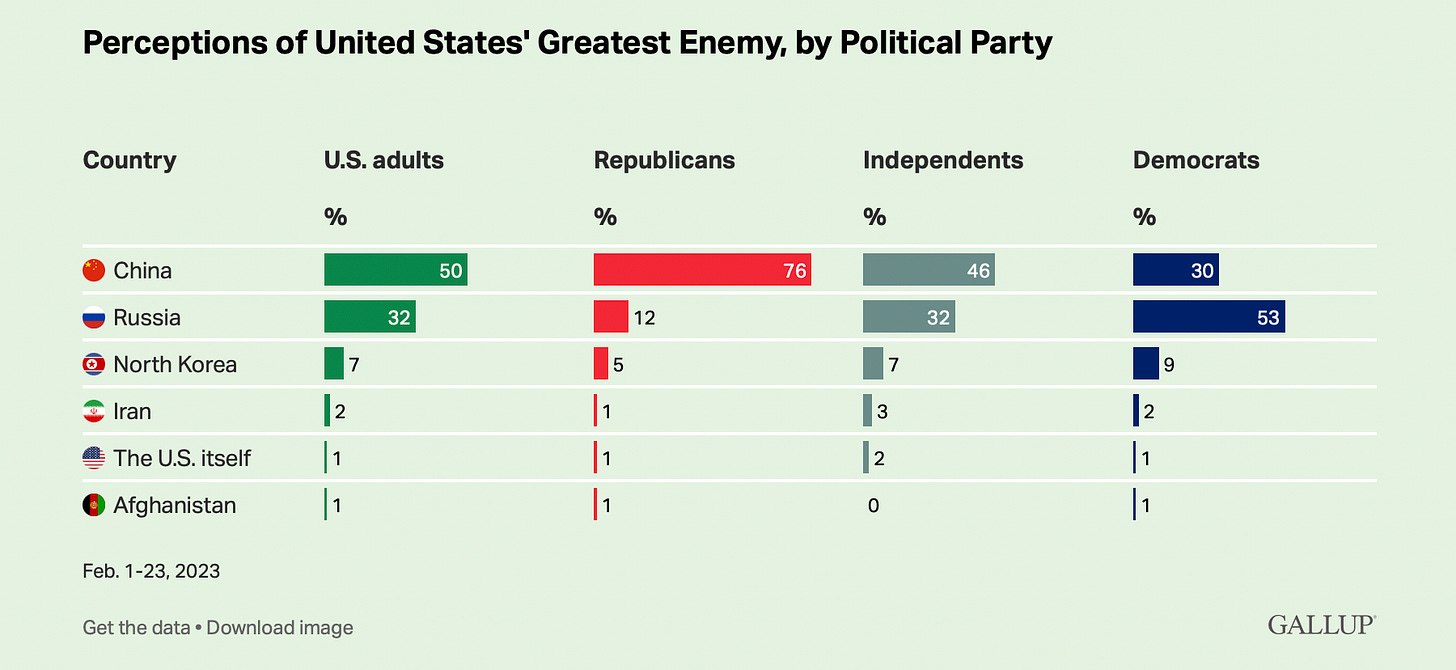Republicans are Defining Domestic Politics on China
Republicans increasingly see China as America’s enemy and want us to act accordingly. Democrats are all over the map.

Political professionals know that clarity beats muddle in terms of public messaging. If one party has more intensity and unity of purpose on a particular issue, then their point of view is likely to dominate political discourse and debate on that issue.
Think of Democratic dominance on health care. Democratic voters and leaders uniformly see health care as a fundamental human right and have banded together over many years—despite some policy differences internally—to protect the Affordable Care Act. In contrast, Republicans may not have liked the Obama health care plan when it was passed, but they never agreed on an alternative replacement and failed to mount a successful counterattack as the legislation took hold with the public. Independents tend to side with Democrats on health care so the party’s political control of the health care issue has been solidified.
On the matter of countering China, however, Republican determination and framing of the issue may soon overwhelm Democratic confusion and lack of clarity about what to do in response to China’s rise.
For starters, the views of both Republican voters and leaders on China have hardened noticeably in the past few years. Consider new data from Gallup showing a dramatic increase in the percentage of Americans viewing China as America’s greatest enemy. In 2018, only 11 percent of Americans said that China was our greatest enemy, compared to 51 percent who said North Korea. By February 2023, 50 percent of all Americans list China as our greatest enemy.
How did this shift occur? Looking at partisan trends on this question, at least 7 in 10 Republicans have listed China as America’s greatest enemy in each of the past three years—hitting a high of 76 percent in 2023. The inverse is true for Democrats: in each of the past five years, Democrats have named Russia as America’s greatest enemy with 53 percent saying so in 2023.
The rub of it comes with independent voters. A strong plurality of independents, 46 percent, echo Republicans in viewing China as our greatest enemy, with Russia coming in second at 32 percent. Near uniform concerns about China as our enemy among Republicans and many independents, along with 3 in 10 Democrats, has produced the overall spike in worries about China.
The Republican political position on China is much clearer than the one from Democrats. If you had to summarize the respective views of both parties on China, could you do so? The Republican political position seems clear: China is our enemy; cut them off economically; bolster our military and defenses; and close the borders. Republicans and conservative media have a consistent narrative about Chinese aggression in stealing American economic secrets; undermining American jobs; deceiving the world on Covid; threatening Taiwan; and helping cartels flood our communities with fentanyl, etc.
Congressional Republicans are spending lots of time with their new House majority highlighting a variety of economic and military threats from China. Although the specific policy recommendations from Republicans may not be entirely coherent or realistic—particularly coming from the more unbridled Trump and “America First” camps—at least people know where they stand.
Democratic voters and leaders, in contrast, are completely fractured in their approach to China.
The left faction of Democrats is mostly concerned with restraining American power, stressing anti-racism in China rhetoric, and seeking greater cooperation with China on issues such as climate change. Many in the traditional centrist Democratic faction still hold on to optimism that engagement with China on trade and other economic matters will lead to positive outcomes inside of China and reduced tensions between our two nations.
The notion of “competition” with China is the only idea that gets some unity among Democratic voters and leaders. But few politicians on the Democratic side, if any, can define what competition with China means and how it protects us against rising threats from China.
President Biden’s nascent industrial policy is a stab in the right direction, but it has yet to sink in with voters. The administration’s stated China strategy—“invest, align, compete”—sounds like a think tank report not a politically potent message for Americans:
We will invest in the foundations of our strength here at home – our competitiveness, our innovation, our democracy.
We will align our efforts with our network of allies and partners, acting with common purpose and in common cause.
And harnessing these two key assets, we’ll compete with China to defend our interests and build our vision for the future.
Is China our enemy or not? Republicans and most independents think so. Democrats mostly refuse to answer the question. With the 2024 primaries and general election soon upon us, expect Republicans to hammer their political advantages on this issue by constantly accusing the Democrats of being soft on China and wasting military resources on Ukraine.
Given the overall hardening of public views on China, some of this will surely take a toll.
If Biden and Democrats want to align themselves more with critical swing voters, and not get outflanked by Republicans, they need to raise their urgency level and express concretely how they are fortifying America against the threats from China.
Measured policy ideas only go so far. You must win the hearts and minds of voters on the politics as well. On China, Republicans currently have the advantage and Democrats are too divided and cautious to mount a serious counterattack or offer an alternative path.
There’s plenty of time and good ideas to do this but the party needs to take the political challenge more seriously and drop the muddle on China.




